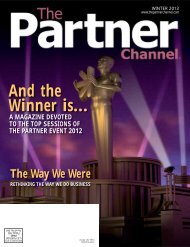The Partner Channel Magazine Winter 2016
The Partner Channel Magazine share sales, marketing, and leadership tips for Microsoft Dynamics Partner organizations on a quarterly basis
The Partner Channel Magazine share sales, marketing, and leadership tips for Microsoft Dynamics Partner organizations on a quarterly basis
You also want an ePaper? Increase the reach of your titles
YUMPU automatically turns print PDFs into web optimized ePapers that Google loves.
LEADERSHIP<br />
A NEW<br />
APPROACH TO<br />
Communication<br />
story by AMBER BARNES<br />
illustration by MATT MASTRUD<br />
With all the practice we’ve had in communication over our lifespan, you’d think<br />
that it would come to us easily once we entered the “real world” of work.<br />
Most of us learned to speak as toddlers, we were taught to read and write<br />
as we went through grade school, and some of us may have even taken<br />
communications classes in college. Should be a piece of cake, right?<br />
Unfortunately, my experience in business (and for that matter, in life) has<br />
been a resounding and hearty “No.” But, why? If we’ve put so much of our time into practicing, why<br />
is it that a majority of our communication doesn’t work the way we expect or need it to?<br />
In business, if a process or strategy isn’t working, it’s a wise practice to reflect on what’s missing.<br />
When it comes to communication, maybe it’s time to consider the fact that we’ve been practicing<br />
all the wrong things.<br />
(Warning: <strong>The</strong> practice prescriptions I’m about to share with you will definitely work in<br />
your office and among your business partners. <strong>The</strong>y will also work in your personal life and the<br />
community at-large. Symptoms may include nodding heads, improved productivity, and “getting it<br />
right the first time.”)<br />
#1<br />
PRACTICE<br />
PITFALL<br />
USING FUZZY LANGUAGE<br />
Google the word “culture” and take a quick look at the number of<br />
results that come back. Each result has a different take and a different<br />
perspective about what the word means. Same rings true for most words,<br />
processes, and ideas. What we practice, however, is normally not a<br />
story reflection by LINDA of this truth H. but YATES the exact | illustration opposite. Instead, by we use:<br />
SHAWN » His definition OLSON of “professionalism” is the same as mine.<br />
» Her understanding of what a sales process looks like mirrors mine<br />
exactly.<br />
» My channel <strong>Partner</strong> should know what “customer service” means.<br />
Does this sound about right? <strong>The</strong> problem is, when we use fuzzy language or vague words and assume<br />
others have the same definition of something that’s important to our work, we are immediately setting the<br />
stage for miscommunication and a lack of clarity.<br />
34 WINTER <strong>2016</strong> | THEPARTNERCHANNEL.COM














